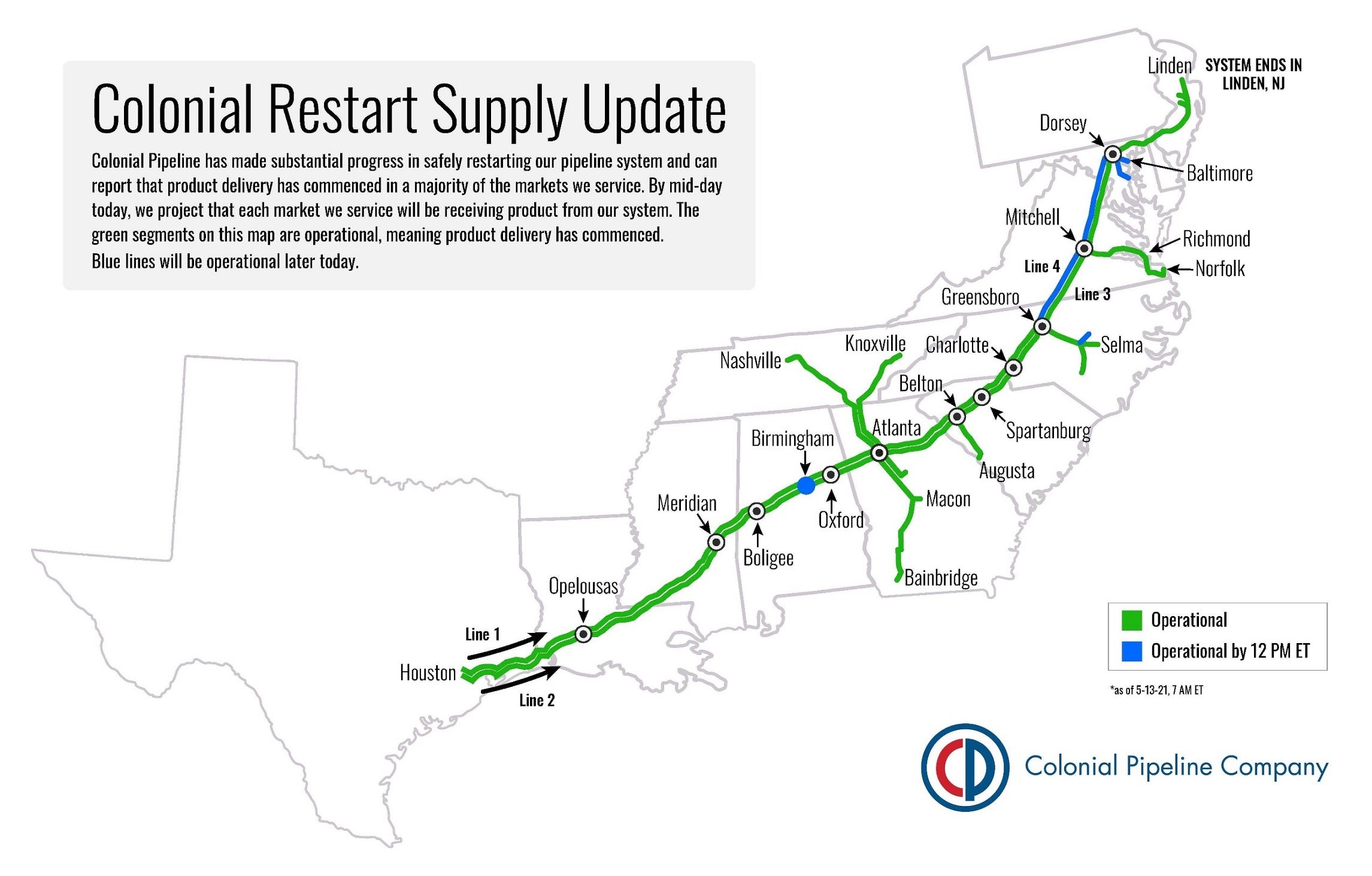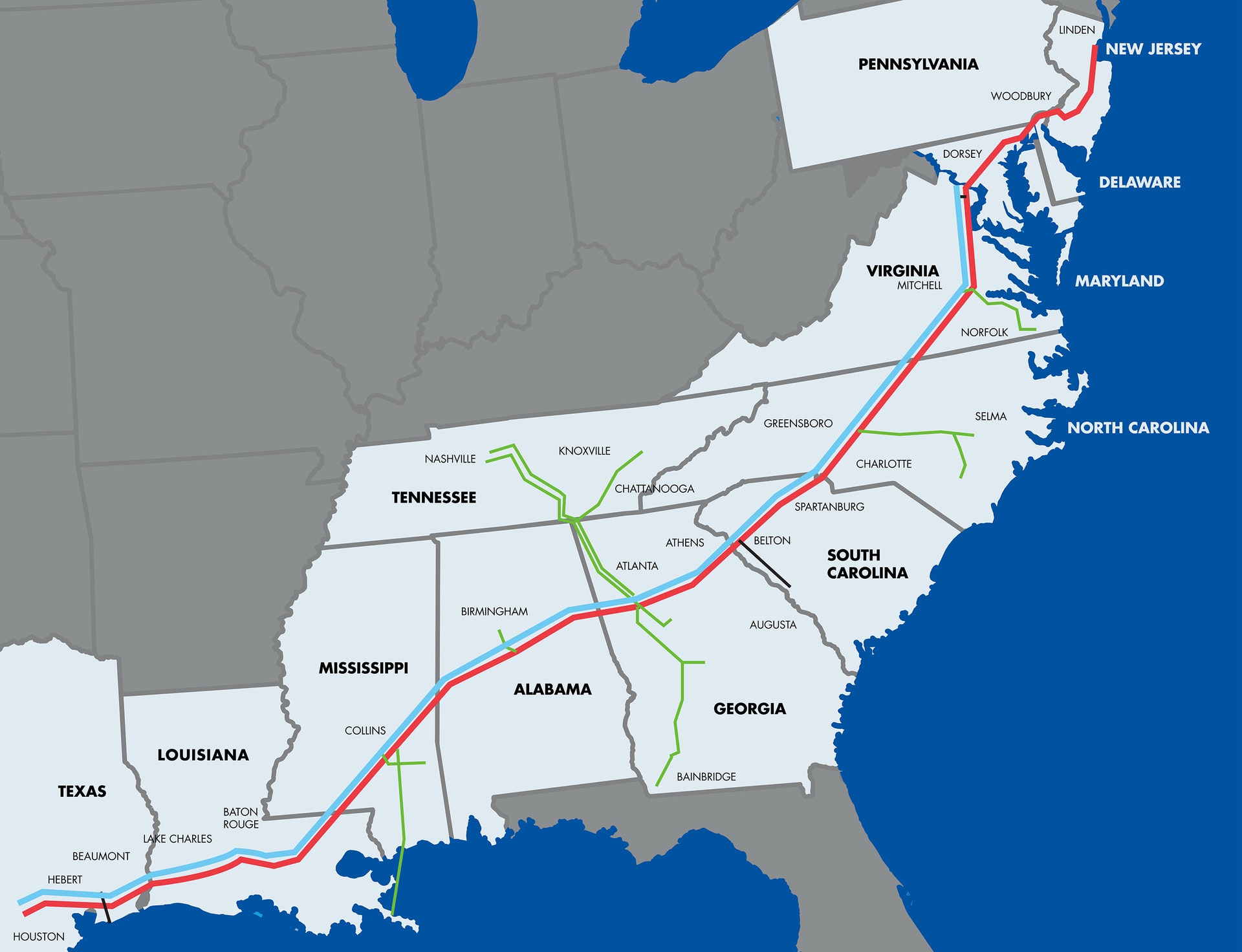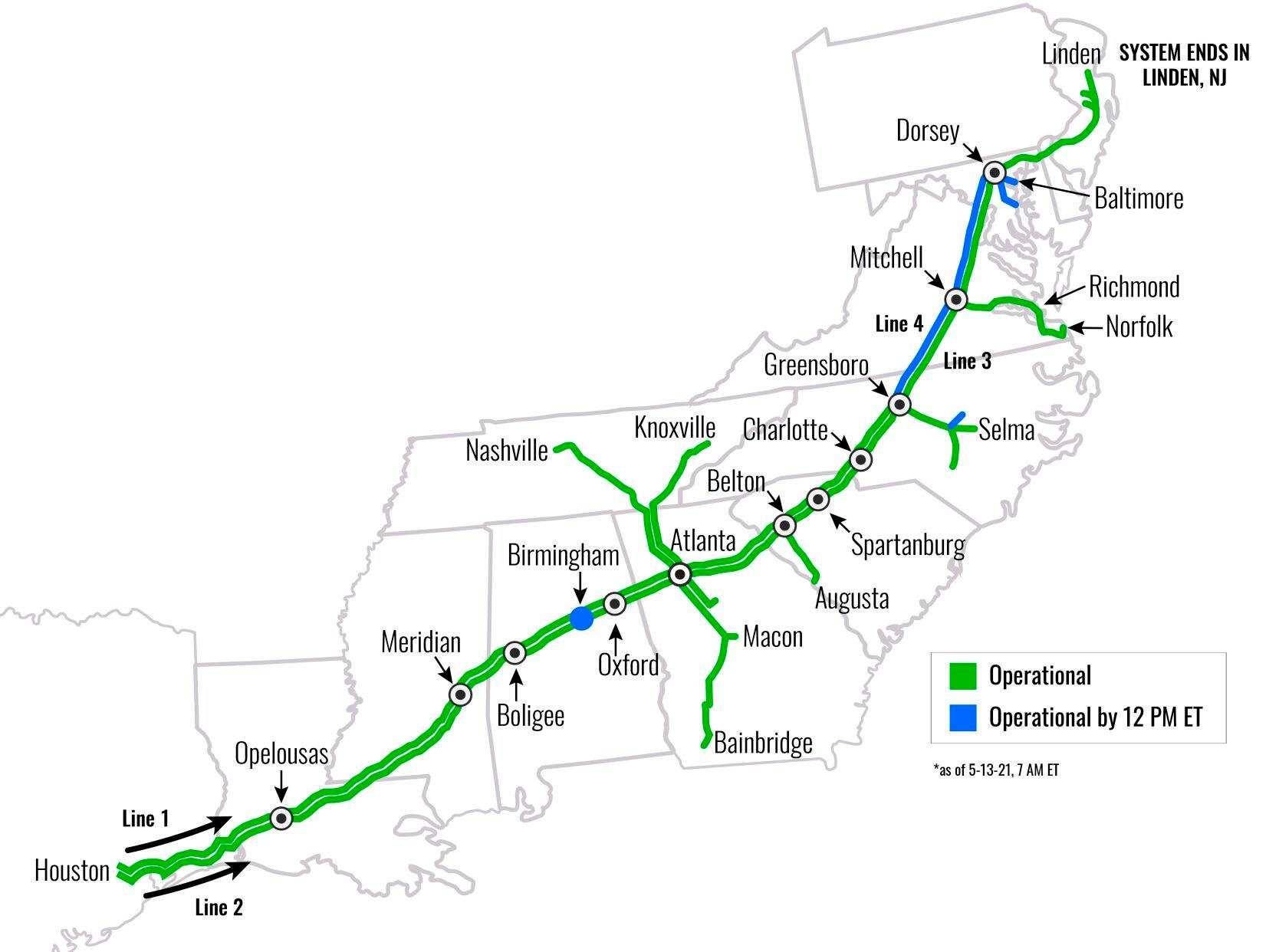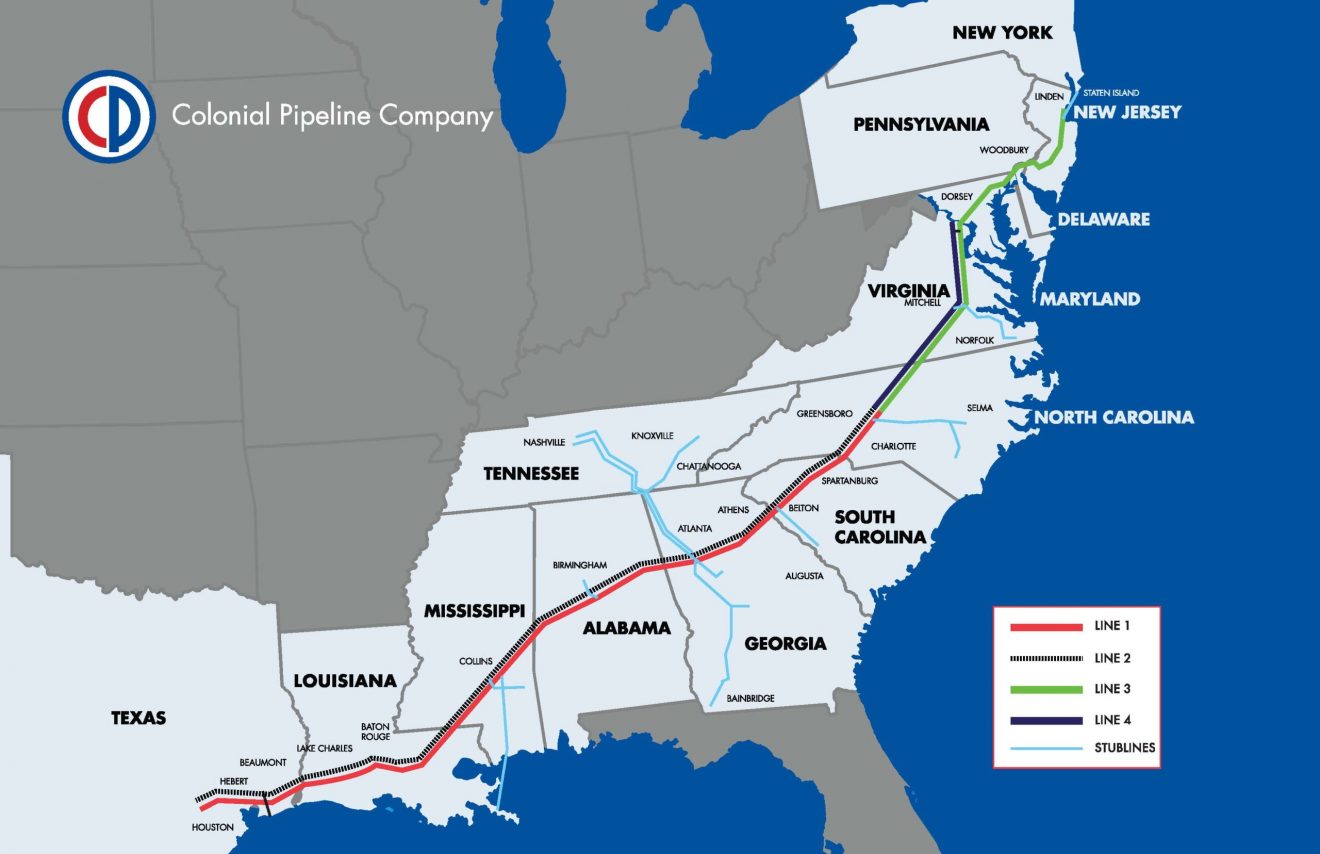The Colonial Pipeline: A Vital Lifeline Through New Jersey
Related Articles: The Colonial Pipeline: A Vital Lifeline Through New Jersey
Introduction
With enthusiasm, let’s navigate through the intriguing topic related to The Colonial Pipeline: A Vital Lifeline Through New Jersey. Let’s weave interesting information and offer fresh perspectives to the readers.
Table of Content
The Colonial Pipeline: A Vital Lifeline Through New Jersey

The Colonial Pipeline, a crucial artery of the American fuel infrastructure, traverses a significant portion of New Jersey, delivering refined petroleum products to millions of consumers across the East Coast. Its presence in the state is not just a matter of logistics; it underscores the vital role the pipeline plays in ensuring energy security and economic prosperity.
Mapping the Route:
The Colonial Pipeline’s New Jersey segment is a 145-mile stretch, part of its 5,500-mile network that extends from Houston, Texas, to Linden, New Jersey. The pipeline’s path through the state cuts across its diverse landscape, from the bustling urban centers of northern New Jersey to the more rural areas of the south. It traverses several counties, including:
- Essex: The pipeline enters New Jersey in Essex County, passing through the city of Newark, a major transportation hub and industrial center.
- Union: It continues through Union County, home to Elizabeth, a key port city and a significant industrial area.
- Middlesex: The pipeline then crosses Middlesex County, encompassing New Brunswick, a major educational and cultural center.
- Somerset: Somerset County, with its mix of suburban and rural communities, is also traversed by the pipeline.
- Hunterdon: Finally, the pipeline reaches Hunterdon County, known for its agricultural heritage and scenic beauty.
A Lifeline for Fuel Distribution:
The Colonial Pipeline serves as a critical conduit for the transportation of gasoline, diesel fuel, jet fuel, and other refined petroleum products. Its efficient and reliable operation ensures a steady supply of these essential fuels to numerous consumers, businesses, and industries across New Jersey and beyond. The pipeline’s capacity allows for the delivery of approximately 100 million gallons of fuel per day, significantly contributing to the state’s energy needs.
Economic Impact and Energy Security:
The Colonial Pipeline’s presence in New Jersey has a significant economic impact, creating jobs and stimulating economic activity. The pipeline’s construction and maintenance generate employment opportunities in various sectors, including engineering, construction, and logistics. Moreover, its reliable operation ensures the smooth functioning of key industries, minimizing disruptions to supply chains and economic activity.
The pipeline also plays a crucial role in bolstering energy security. By providing a reliable and efficient means of fuel transportation, it reduces the state’s dependence on other modes of transport, such as trucks, which can be susceptible to disruptions due to weather conditions or other factors. The pipeline’s capacity to handle significant volumes of fuel ensures a steady supply, mitigating potential shortages and price volatility.
Environmental Considerations:
The Colonial Pipeline’s operation is subject to stringent environmental regulations, aimed at minimizing its impact on the surrounding environment. The pipeline is buried underground, reducing its visual impact and minimizing potential disturbances to wildlife and ecosystems. The pipeline’s operators implement comprehensive monitoring and maintenance programs to ensure the safe and responsible operation of the infrastructure.
Addressing Concerns:
While the Colonial Pipeline’s contribution to New Jersey’s energy security and economic prosperity is undeniable, it is not without its share of concerns. Some residents have raised concerns about potential environmental risks, such as leaks or spills, and the potential impact on local communities. These concerns are addressed through stringent safety protocols, regular inspections, and ongoing efforts to minimize environmental risks.
FAQs about the Colonial Pipeline in New Jersey:
- What type of fuels does the Colonial Pipeline transport? The Colonial Pipeline primarily transports gasoline, diesel fuel, jet fuel, and other refined petroleum products.
- How does the pipeline contribute to New Jersey’s economy? The pipeline creates jobs, stimulates economic activity, and ensures the smooth functioning of key industries.
- What measures are in place to ensure the pipeline’s safety? The pipeline’s operation is subject to stringent safety regulations, including regular inspections, maintenance programs, and emergency response protocols.
- What are the potential environmental risks associated with the pipeline? Potential risks include leaks or spills, which are mitigated through rigorous safety protocols and environmental monitoring.
- How does the pipeline contribute to energy security in New Jersey? The pipeline provides a reliable and efficient means of fuel transportation, reducing dependence on other modes of transport and ensuring a steady supply of fuel.
Tips for Understanding the Colonial Pipeline:
- Research the pipeline’s history and development: Understanding the pipeline’s evolution provides valuable context for its current role and significance.
- Explore the pipeline’s route and its impact on local communities: Examining the pipeline’s path and its interactions with different communities sheds light on its potential benefits and challenges.
- Learn about the safety measures and environmental regulations governing the pipeline: Familiarizing oneself with the pipeline’s safety protocols and environmental regulations helps understand the efforts to minimize risks.
- Engage in discussions about the pipeline’s role in energy security and economic development: Participating in conversations about the pipeline’s impact on the state’s energy landscape and economy promotes informed decision-making.
Conclusion:
The Colonial Pipeline’s presence in New Jersey is a testament to its vital role in the state’s energy security and economic prosperity. The pipeline’s efficient operation ensures a steady supply of fuel to millions of consumers, businesses, and industries, contributing to the state’s economic growth and stability. While concerns about potential environmental risks exist, stringent safety protocols and ongoing efforts to minimize impact are in place to ensure the pipeline’s responsible operation. Understanding the pipeline’s significance, its impact on local communities, and the measures taken to address concerns is crucial for informed decision-making regarding the future of this vital infrastructure.

![]()






Closure
Thus, we hope this article has provided valuable insights into The Colonial Pipeline: A Vital Lifeline Through New Jersey. We appreciate your attention to our article. See you in our next article!